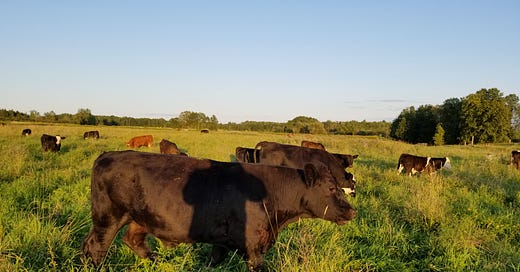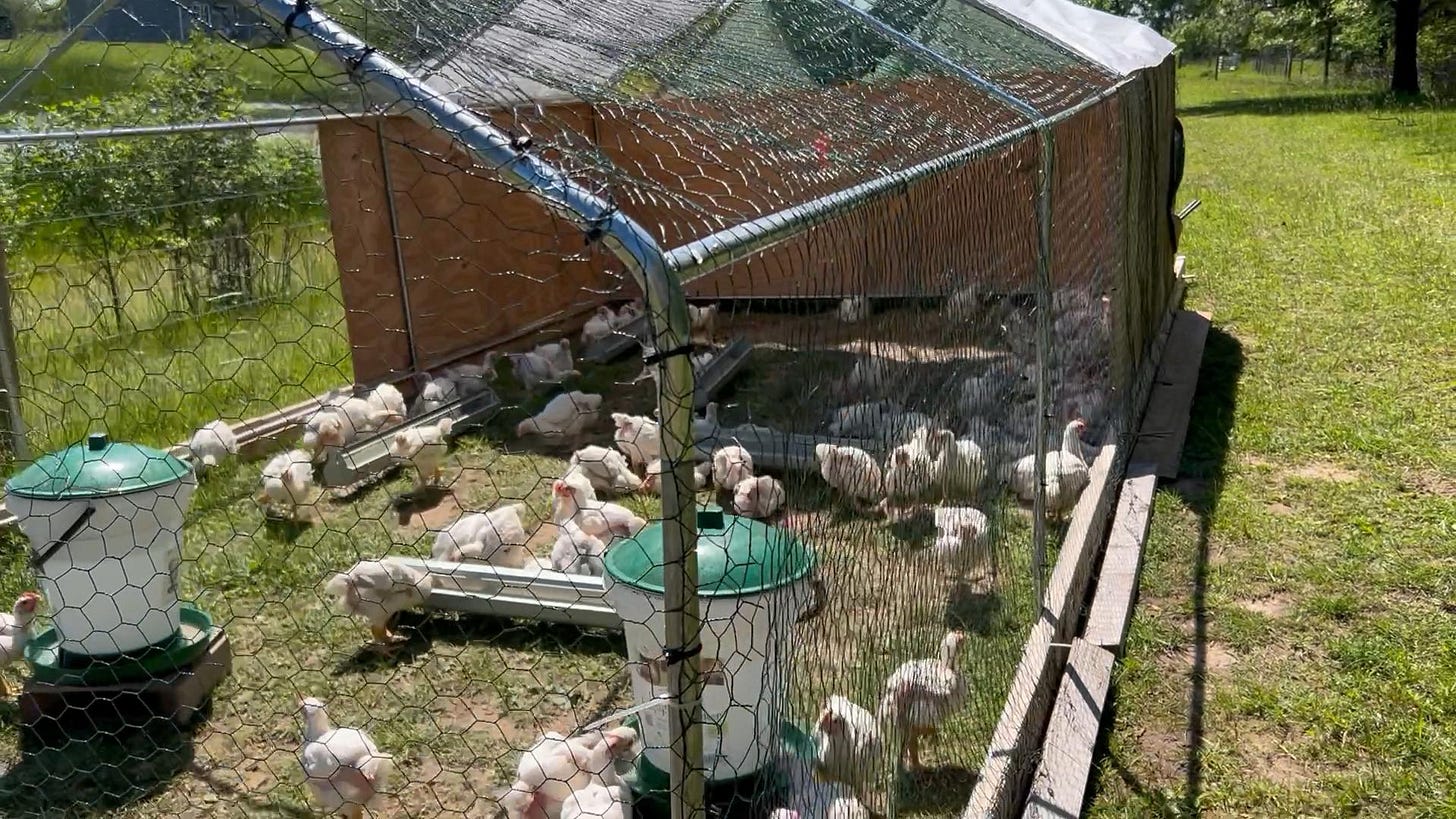The short answer is: Nope, we are not certified organic. Mostly because we didn't ever jump through the hoops so we could get certified as organic. There are other reasons besides certification that keep us from being certified as well. We do have most of the qualifications in but not all.
We have animal raising methods that we use that are close to organic, but not all the way. I will go through each of our major animal species and tell how we raise them.
Beef: The main thing we do on our farm is finish grass fed beef animals. They are grass fed when we get them and then we do the grass finishing. We buy cattle in the spring from farmers who are cow/calf operators. We also buy some cattle in the fall from farmers that we know grass feed and finish their animals. Our farmers feed their cows grass in the summer, hay in the winter and produce calves every spring. They sell the calves in the fall and that is how they make money.
The cow's job is to have a calf every year. If she doesn't have the calf, the farmer has to 'fire' her. That is where we come in. These farmers feed their cattle grass and hay. Grass in the summer, Hay in the winter. Once in a while, the cow/calf farmer will also give his cows enough grain so that they come when they are called.
Grain is like candy to a cow. A handful of grain once in a while is not going to hurt them, but a diet of straight grain is definitely going to make them sick. Just like a diet of candy bars, coke and ice cream would make you unhealthy. In a cow the sickness caused by grain is called rumen acidosis and is basically a long term heartburn that they can die from. Our farmers don't get anywhere near that much grain and in fact when the cow comes to our farm, they don't get any grain at all. I would estimate that the cattle we buy in this fashion get about 1 thousandth of 1 percent of their diet as grain. Maybe one mouthful out of 100,000.
The amount of grain the cows get before they come to our place is very little and since it takes 90 days on straight up grass to straighten out the fat profiles in their meat, I don't consider this to be a problem. If you do consider this to be a problem, we do not have any quarrel with you, you can go your own way with no worries. We will go our way with no worries.
We buy the cow from the farmer either in the spring when she shows up without the calf, or in the fall when she shows up as not pregnant. We then put her on grass and finish her as a grass fed animal. She goes to processing in the fall after she has had a summer vacation of no calf to feed and only the best grass. She is fattened up, has good marbling and has had the best treatment of her life.
I would say our protocol on beef is about 95% organic. The grass they get is totally organic but is not from a certified organic farm (our farm). The hay they get in winter is also organic but none of it comes from certified organic farms. The tiny bit of grain they get is also not organic.
Pork: Nope, these are not certified organic either.
Our pigs are raised either outside or in pens where they can see the sky and get fresh air and space. They are not pastured pork in that they do not get to run around out in a field and root up the ground like a wild hog would do. Our pig farmers mostly haven't worked out how to feel safe with pigs running around outside with just a single electric wire.
I must admit, the one year I raised pigs, I did have them in a single strand electric fence and once they were trained we had no trouble with them. Before they got trained we had some problems… I was also on pins and needles whenever we left the farm to do a delivery. A herd of pigs that gets out and into a neighbors cornfield or garden is an absolute disaster. Google 'wild hog damage' and you will get an eyeful. We never raised pigs ourselves after that one year. It was just too nerve wracking to have the pigs home all alone with nobody to ride herd on them while we did deliveries.
The grain the pigs get is mostly corn and soybeans. There is also vitamins and minerals and the pigs get hay or corn stalks to make nests out of and play with. We are working on getting non GMO corn and soybeans but so far we have not been able to find any that is low cost enough. We would need to raise our prices by at least a dollar per pound in order to pay for the non GMO corn and soybeans. Some of our customers would be willing to do that but a large portion would not be able to make that jump. So we continue as we are.
Chicken: They are also not certified organic. The grain they get is mostly Non GMO though sometimes the chicken farmer is not able to get it at a low enough cost so I cannot guarantee that it is all Non GMO. We have one smallish feed mill that is grinding the feed for the chickens and the miller is not always able to come up with the Non GMO stuff. The Non GMO grains are also not certified organic. I wrote a post about this subject in the past. Here is the link: https://substack.com/home/post/p-147857697
The chickens are pastured in chicken tractors and moved to fresh grass and bugs every day.
I consider the chicken and the beef the highest quality meats that we produce. We are working on the pork but as you can see there is still a ways to go on that.
No worries.
SV






